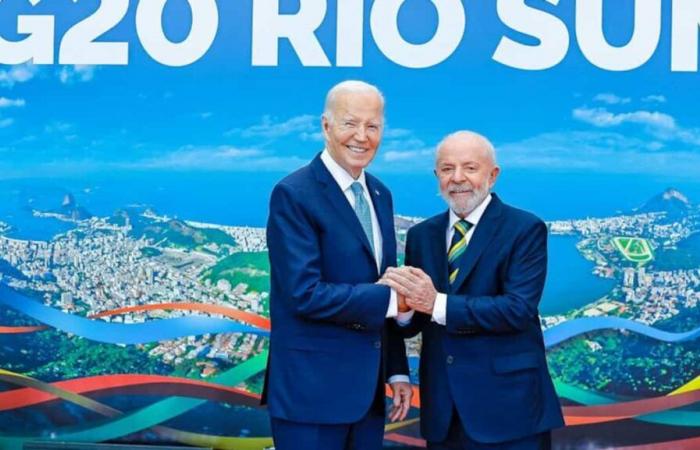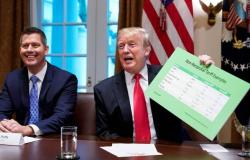Conflicts were invited on Monday at the opening of the G20 summit in Rio de Janeiro, with a mention from Joe Biden for Ukraine and a ceasefire in the Middle East, while the Chinese Xi Jinping warned of an era of “turbulence”, a few weeks before the return of Donald Trump.
• Also read: Biden on historic visit to the Amazon, a symbol for the climate before Trump’s return
Left-wing President Luiz Inácio Lula da Silva, whose country is this year at the head of the forum of the world’s largest economies, wanted to leave conflicts aside to focus on “the poor, the invisible of the world”. But he was quickly caught up in the news.
From the first plenary session, American President Joe Biden urged the G20 countries to support the “sovereignty” of Ukraine.
“The United States strongly supports Ukraine’s sovereignty and territorial integrity. Everyone around this table, in my opinion, should do the same,” he said.
Words which take on particular resonance at a strategic moment: the United States in fact gave Kyiv the green light on Sunday for the use of its long-range missiles against Russia.
Joe Biden also urged the G20 to “increase pressure on Hamas” for a ceasefire with Israel, while assuring that he would “continue to work for an agreement” before leaving power.
The American president is participating in one of his last major international meetings before handing over the keys of the White House to Donald Trump, a declared opponent of multilateralism.
“The world is currently entering a new period of turbulence and change,” warned Chinese President Xi Jinping during an interview with British Prime Minister Keir Starmer.
Xi Jinping, who appears to be the strong man at the summit facing Biden at the end of his term, has a series of bilateral meetings of this type on his agenda.
Russian President Vladimir Putin, who had already missed the last summits, is notably absent in Rio.
Hot and cold of Argentina
Will G20 leaders be able to overcome their differences to agree on a final declaration, and if so, with what content?
“For Brazil and other countries, the text is already closed, but some countries wish to reopen certain points on wars and the climate,” a source at the Brazilian Ministry of Foreign Affairs told AFP on Monday morning, without comment. say more.
“Discussions on Ukraine and the Middle East […] are the most difficult. We will see how far we can go in communication, it will be a challenge,” a German government source admitted before the G20.
The members of the G20 (19 countries, as well as the European Union and the African Union), which represent 85% of global GDP and 80% of greenhouse gas emissions, are also eagerly awaited on the subject of the climate.
UN Secretary General Antonio Guterres asked them on Sunday to assume their “leadership” and make “compromises” to unblock the negotiations which have been stalling for more than a week at COP29, the climate conference. in Baku.
Another uncertainty: the attitude that Argentine President Javier Milei, ultraliberal and climate skeptic, will adopt.
Buenos Aires has raised objections and will not “necessarily” sign the text, the head of the Argentine delegation, Federico Pinedo, told AFP on Sunday evening, without going into details. But the Brazilian diplomatic source cited above downplayed the Argentine opposition.
Buenos Aires already stood out on Monday morning by being the only G20 country not to appear on the list of 81 countries of the Global Alliance against Hunger and Poverty, launched by Lula.
The coalition aims to unite efforts in order to free up financial resources or replicate initiatives that work locally.
Argentina finally changed its mind a few hours later and joined the Alliance, according to a Brazilian government source.
Relations between Javier Milei and Lula are execrable. The icy handshake they exchanged just before the summit showed this vividly.






